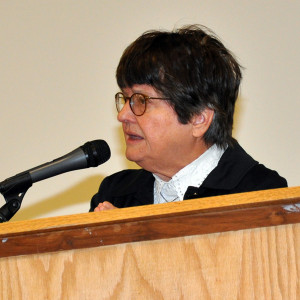
Sister Helen Prejean spoke at the FFA Building on the Ankeny Campus Thursday, Nov. 6. Photo courtesy Dan Ivis.
For years there has been a battle raging behind the scenes of the death penalty. Both sides of the argument are passionate about their beliefs, but which side is standing on the right side of the fence?
Sister Helen Prejean, author of the award winning novel and movie, “Dead Man Walking,” recently spoke at DMACC as part of the “Book of the Year” program, sharing some of her deep knowledge on the subject.
Sister Helen began her journey in 1982 as an advocate for abolishing the death penalty as a spiritual advisor to death row inmate, Patrick Sonnier, who had been convicted of a double murder.
Sonnier had been charged for the crime, along with his brother, though he was the only one of the two to receive the death penalty. Sister Helen would spend two years visiting with and advising Sonnier before his death by electric chair in 1984.
After Sonnier, she would go on to be a witness to five more executions. She would also become a leading advocate against the death penalty.
Upon the release of “Dead Man Walking” in 1993, the book would spend 31 weeks at the top of the New York Times best seller list.
It would go on to open the eyes of people all around the world about what is really involved in the taking of someone’s life by the state.
The death penalty is still active in 32 states and as of January 2014 there are 3,070 inmates currently awaiting execution on death row.
This statistic is only from 1976, when the death penalty was reinstated after a four-year suspension ordered by the Supreme Court, following the Furman v. Georgia case in 1972.
Since the adoption of the death penalty in 1834 there have been many different forms of execution methods: electric chair, gas chamber, firing squad, hanging, lethal injection.
Lethal injection is the current method typically used, but the days of hangings and firing squads are not that far behind us.
The last recorded hanging in the United States was in 1996 in Delaware; the last by firing squad in 2010 in Utah.
Imagine that for a second. Less than twenty years ago the United States still took part one of the most barbaric forms of execution, hanging, and just four years ago a death by firing squad.
Sister Helen argues for human rights in her book and her speech, asking if there is such a thing as a humane way to take someone’s life.
She also talks about how inmates with money have a much lower chance of having the death penalty sought, simply because the D.A will not take the chance on losing if the defendant can afford a competent lawyer.
Instead leaning towards the cases that will most likely be open and shut cases for them.
She also asked the question, “Is the death penalty torture?” Yes, we have lethal injection now, which is said to be painless, but what about mentally?
Every day on death row the criminals are forced to play through their own death in their minds, from the walk to the death room to their last breaths.
Should this be considered cruel and unusual punishment?
Another factor in the debate of the death penalty—besides the obvious, human rights—is the cost of the entire process.
The cost of the average murder case without the death penalty being sought is $740,000 dollars, while cases where it is sought cost up to $1.2 million dollars.
Also maintaining prisoners on death row cost on average $90,000 more per year than a prisoner living out a life sentence in general population.
That’s money coming out of the tax payer’s pockets, simply to take the life of someone already in prison paying for their crime.
Sister Helen has served on the board of the National Coalition to Abolish the Death Penalty from 1985–1995, and has served as Chairperson of the Board from 1993–1995.
She is also a member of Amnesty International and an honorary member of Murder Victim Families for Reconciliation.
She plans to fight for the end of the death penalty until she leaves this earth.





Comments